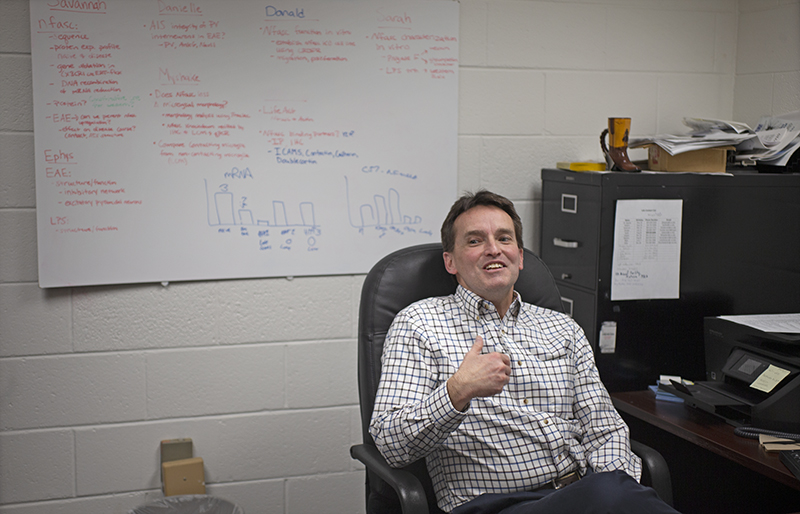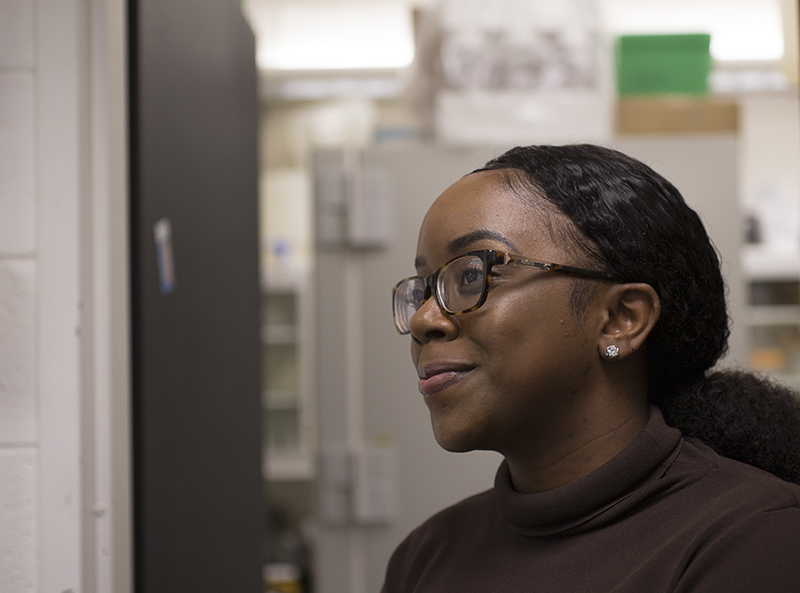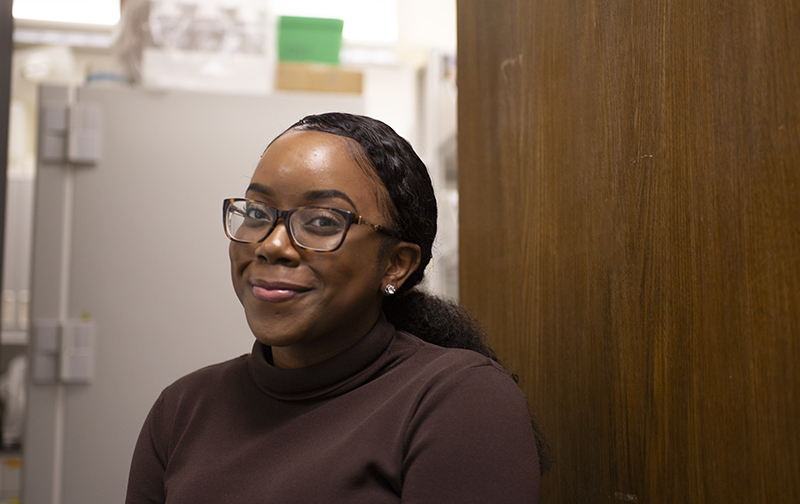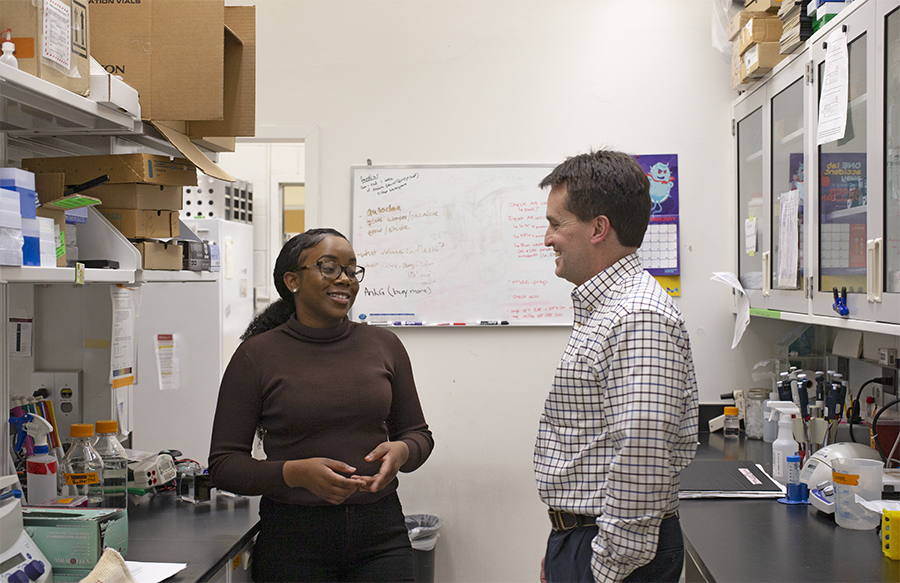Dr. Jeffrey Dupree
(COHD) Tell us how you began your career in biomedical sciences.
(D) As an undergraduate student, I liked biology but I had no idea what I wanted to do. But I knew I did not want to go to medical school. With a biology degree, you’re limited so I worked as a technician for two years and really enjoyed research. I didn’t have any research experience because I went to a very small school.

(COHD) What kind of technician?
(D) I worked at Eastern Virginia Medical School where we studied peripheral nerve graft repair. We were actually cutting nerves on rats and sewing them back together and watching the rats go from having complete hind limb paralysis to being able to walk again. It was pretty amazing. I really enjoyed it. At that point I went back to school for graduate work and went from there. I ended up doing my PhD at VCU. I worked with Dr. John Bigbee and we worked on neurons. After graduating, I went to the University of North Carolina at Chapel Hill for my postdoctoral training where I worked with glia, the cells that support neurons. The glial cell that I focused on is known as the oligodendrocyte. This cell makes myelin, an insulating wrap of nerve cells. When you study myelin, you study multiple sclerosis, a disease that results from the loss of myelin. There was never a definitive decision to study multiple sclerosis; it kind of evolved based on my project. From my time as a technician through my current position, I just really enjoy research.
(COHD) What is the ultimate goal of your research?
(D) Our funding comes from the National Institutes of Health, the Department of Veterans Affairs, and the National Multiple Sclerosis Society. The National Multiple Sclerosis Society says that the goal is to put ourselves out of business. So, the idea is that we come up with a cure. We want to cure MS. That is the goal. However, we actually study more than MS. We primarily study MS, but we also do a little bit of research on head trauma and Alzheimer’s disease. For many of these diseases, the underlying mechanisms are probably related. Not identical, but similar. The idea is that we want to cure these diseases. Right now, we’re working on treatments. Treatments aren’t bad, but curing is where we really want to go.
(COHD) In looking at your mentees, what do you wish you knew when you were in their position?
(D) I wish I had a better understanding of what the future held - what it actually takes in order to be successful. It’s very rewarding but it’s much more difficult than I ever thought. Perhaps, in one sense, it was better that I did not know. I was a bit unsure of myself and I may have said ‘Oh, I can’t do this.’ You want someone who has kind of gone through it and who can provide encouragement but honestly say ‘Look, it is hard but you can do this.’
(COHD) If you had known more about it then would you have made a different decision?
(D) I ask myself that daily. I don’t think so because if I’m not going to do this then what would I do? I really enjoy it. It’s really difficult; funding is hard but there’s nothing else that I would want to do. So, no. I would probably still do it.
(COHD) If you weren’t doing biomedical research what do you think you would be doing?
(D) The only other thing I could think I’d be doing is teaching. When I first got out of my postdoctoral training, I interviewed with several small undergraduate schools where I would primarily teach and do a little bit of research on the side. At those schools, the research allows you to maintain a lab so that the students have an opportunity to do research but the scope of what can be done is limited. The research is at a completely different level and the goals are very different. You’re only allowed to do research from probably May to August because the rest of the time you maintain a very heavy teaching load.
(COHD) What do you hope to gain from this experience of being a mentor with the research trainees and what are your expectations of your mentees?
(D) I like to see the students learn something from the experience. When I was an undergrad, I looked for undergrad research opportunities and I couldn’t find any. They just weren’t available. The school I went to had very limited research and during the summers, I had to work to pay my way through college. I like to see that the students actually have an opportunity to do the research, take advantage of it and learn something. It’s very rewarding to see students get something out of it but I can also say there’s a selfish side too. The students provide a pair of hands that can work really hard and get data. I’m writing a grant and I needed a particular piece of data and Danielle stained it on Thursday and Friday, we imaged it today and it’s going in the grant. It’s a small part of the grant but it’s a very vital piece. So, on the selfish side, I get quality hands that do work for me and get me the data I need. Hopefully it’s a mutually beneficial situation.
(COHD) Describe the ideal mentor/mentee relationship?
(D) I’m not sure there is an ideal relationship. I think it all depends on the mentor and the student. I’ve had some students that I sit down and talk to them about a project and they run and do great with only minimal guidance. I have other students who you have to help them along and they kind of grow into it. I think it’s completely dependent on the student and how they learn. Everyone learns differently. I can’t tell you the ideal approach with a student when they first start in the lab. Ask me a year and a half after they start and I can tell you how it developed. From day-to-day, I don’t know exactly how we might interact. Danielle actually is interacting more with my postdoc than with me. My postdoc is great. She is very, very good and she and Danielle are working on a very interesting project together. They do the work and then present to me what they have and as a group we discuss the data and address any hurdles.
(COHD) What do you like to do to relax away from the lab?
(D) I work too much and don’t do much relaxing. If I had time, I’d like to sit on the beach, listen to music or read a book or just sit there and do nothing. I get to do that once a year for a week. Each year my family goes to the beach and that is how I spend it. It’s wonderful and it’s nice to get away. Other than that, I pretty much work.
Danielle Pritchard

(COHD) Describe your responsibilities in the lab.
(DP) I would say my biggest responsibility at the moment is getting information to Dr. Dupree so he can continue to fit the pieces together. I’m usually pretty good at comprehending what each experiment is for, however it is only after conducting it and with further analysis as well as explanations from Dr. Dupree and Dr. Benusa that I get the bigger picture.
I have only been a part of this lab for about 7 months. However within that time I was given a project. So far the only thing I’ve really been focusing on is immunohistochemistry and that is labeling different parts of the cell. Using immunohistochemistry, I examined if cortical inhibitory interneurons (neurons that transmit impulses to other neurons) are lost in chronic inflammatory conditions. Additionally, I assessed the axon initial segment (AIS) integrity of remaining inhibitory neurons and quantify inhibitory synapses present at the AIS. These experiments are aimed to understand the underlying mechanisms of cortical network dysfunction present in chronic inflammatory conditions such as Multiple Sclerosis.
(COHD) What are some benefits of working with your mentor?
(DP) I have grown so much in so many ways. For so long my dream was to be a part of a neuroscience lab, and here I am doing exactly it. I feel so much more comfortable and confident in the lab environment than I ever did. However, I’ll say one of the biggest benefits was finding out about the IMSD program. I had heard about it before, but I never even thought of applying until Dr. Dupree mentioned it. Even then I was still nervous about applying, because I really didn’t think I was qualified enough. However, with much convincing from not only from him but also from a former IMSD scholar, Sarah Isabelle, I applied, and well, here I am! It’s not the lab that I only feel comfortable with, but also my career choice. Seeing how the lab runs and how much work it takes really solidifies that this is the field I truly want to be in.
(COHD) Tell me how you have grown in your time with Dr. Dupree as a researcher?
(DP) I’d say I’ve been able to analyze data better, especially when it comes to scientific articles. I used to read scientific articles and not understand anything. Now I get exactly what the paper is stating and see how they accomplished what they did, and I appreciate it more because I understand it. I also have a stronger love for neuroscience. Learning about it constantly and seeing how the brain works is really interesting.

(COHD) What do you like about VCU and what do you like about Richmond?
(DP) What I love about VCU is that it's in the city. I grew up in a small town in Jamaica and living in the city has always been something I wanted. However, Richmond’s rich culture is what I really fell in love with. I mean I have never been an artistic person but after living here for these past few years I definitely feel my creative side coming out. What I would say I love the most about VCU is that it gives students so many opportunities. A lot of students I know would love to be in different programs such as this, but unfortunately their university doesn’t offer it. Additionally, VCU’s diverse environment makes me feel so a part of [it all].
(COHD) How did you find out about VCU?
(DP) I knew from the beginning that I wanted to go to a university that was in the city, and upon searching VCU became my first choice.
(COHD) What do you like to do when you’re away from the lab?
(DP) When I’m away from the lab I binge watch Netflix, read and look up the latest trendy outfits on pinterest. That’s essentially all I do. Either that or doing homework.
(COHD) Is there anything else that you’d like to add either of you?
(DP) I’d just like to add that I’m really appreciative for this opportunity. I was telling Sarah Isabelle, who also helps students get into research, that I wish I had her to help me out when I was in that position where I didn’t know how to reach out to a mentor. I was so scared emailing you (Dr. Dupree). I looked up on Google ten different ways to email a mentor and what to write. I was really nervous because I didn’t even expect you to reply. In my mind I thought the most you would say is you prefer someone with experience; I just feel like everything worked itself out. Initially, I was gonna send it to another person I had seen while researching, but I decided to email you first, then you replied, and everything just started to align. My dreams of being a future researcher are literally coming true.
(COHD) How did you feel when you got her email?
(D) It’s interesting, I get a lot of emails and I just forward them. At the end of the school year we kind of have turnover. We have a lot of Masters’ students that graduate. It was one of those switch outs I guess. It had to be a window of time when we actually have spaces for people. It just worked out.
